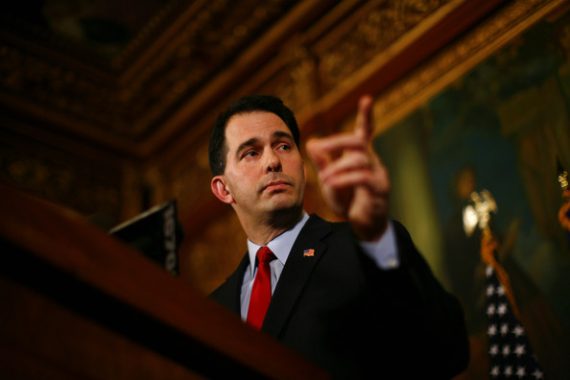Quorum Busting v. Filibustering
The funny thing is that the quorum-busting in WI is more like a filibuster ought to be: a true delaying tactic that eventually has to give way to a democratic outcome.
 Ezra Klein makes an interesting observation:
Ezra Klein makes an interesting observation:
the state’s Senate Democrats can’t stay away forever. In this way, their efforts have been a very traditional filibuster: Not the 60-vote pocket veto we’re used to, where the minority simply refuses to allow a majority vote, but the talk-a-thons of lore, in which a determined minority feel so strongly about their opposition to a bill that they mount a physically exhausting and politically dangerous stand against it, bringing all the other business currently facing the chamber to a halt in a desperate attempt to win the public over to their side. You can’t do that forever, and you can’t do it to often — but then, nor should you be able to. The election went how it went, and after you make your case and appeal to the public and try and shame the majority, you either have the votes or you don’t.
This is all quite important: the actions by the minority party in Wisconsin, unlike minorities in the US Senate, are engaged in a high profile, dramatic, and costly delaying tactic that will, ultimately, still culminate in a vote. The purpose of the tactic is to focus public debate to determine how the citizens of Wisconsin feel about the topic at hand and to determine whether public sentiment should further spur the majority to victory or cause it to reassess its position. If only filibusters in the US Senate functioned this way (i.e., were rare, focused public attention on a real debate, and eventually culminated in a vote where the majority would rule).
This goes along with a point I made this morning:
the quorum-busters were going to have to return or the GOP was going to have to compromise—either way there was going to be a majority vote on a legislative package in the Wisconsin State Senate and in this rather important way, the quorum-busting technique is quite different than the filibuster in the Senate (something that I have seen it compared to in multiple places).
Now, I understand there is an important distinction between quorum-busting and filibustering, i.e., that the purpose of quorum rules is not to empower the minority, while the filibuster’s is. Further, the use of quorum-busting as it is being deployed in WI is, shall we say, an innovative application of a rule in a manner almost certainly not intended by the framer’s of the Wisconsin constitution, while the Cloture rule in the US Senate (which allows filibusters to exist) was intended to place super-majority strictures on the legislative deliberations of that body. The bottom line in Wisconsin (unlike under filibusters in the US Senate) is that there will be a vote at some point. As I said above, either the quorum-busting, protests and polls will convince Walker and/or some number of State Senate Republicans to change their minds and compromise or the Democrats will have to admit to defeat and Walker will win (even if it takes, as Steve Bainbridge suggests, waiting all summer to do so).
Be let me note again the main, and extremely important, distinction between quorum-busting and filibustering: in the former, there will be a vote where the majority will rule, while in the latter a minority can forestall a vote from ever happening. Moreover, as Klein is pointing out in the excerpt above: in the modern version of the filibuster, there is very little pain associated with the minority’s exercise of power.
Let me be clear: what the Democrats in Wisconsin are doing, regardless of whether one agrees with their tactics or goals, is delaying a vote in the hopes of changing public opinion enough that a portion of the majority changes its position. This is not, contra Ann Althouse (and numerous others who have made similar claims), defying democracy (because, to beat a dead horse, a vote will take place). Althouse writes:
I cannot understand why the Democratic senators should get more because of the way they’ve behaved. What kind of an example will that set for the future? No one will accept the outcome of an election anymore. You don’t like what happened? Run away, storm the statehouse, make a cacophony of drum-beating and chants for weeks on end until you get your way. One of the chants has been “This is what democracy looks like.” Is that what we want democracy to look like in the future? No one ever accepts a loss? Instead of working toward the next election, you use any strategy you can think of to prevent the exercise of power by the representatives the people have chosen to run the government?
I would note: I agree that the Democrats should not get something because of their behavior, but rather they should only get something if their actions actually led to further public scrutiny on the issues at hand in a way that makes it clear to the elected legislature that the public repair bill is in opposition to the public’s clear preferences. In other words: this is not about the Democrats simply holding their collective breath until they turn blule in the hopes of forcing Walker into a corner. This is about the public, ultimately.
Here’s the thing: the quorum-busters only win if they persuade the public enough so that Republicans have reason to fear voters going into 2012. In other words: if public opinion is sufficiently clear in terms of policy preferences that it changes the minds of Republican members of the government. This is inherently democratic. If the quorum-busters, on the other hand, overplay their hand and the Democrats suffer in 2012 this, too, is a democratic outcome. Note in all scenarios we have a) public opinion being taken into account, b) a vote in the Wisconsin legislature, and c) electoral accountability for all involved. There is also the possibility of recall actions—also (you guessed it), a democratic process/outcome.
Again: a vote will take place in the Wisconsin legislature—it is just a question of when. The quorum-busters cannot stay gone forever. Indeed, as Althouse rightly note: only one has to return for quorum to be be achieved.
This issue, then, is not the thwarting of democracy or the overturning of an election. Rather, it is all about delay. And no, it is not going to lead to some constant fleeing of state legislators. This is the kind of thing that is rare because it requires solidarity of the minority in the context of an issue that they are willing to go to personal hardship and expense to maintain. In other words: it takes something drastic to inspire this type of action and I cannot see it being a regular occurrence over every little disagreement of governance. Indeed, the ability for state legislators to pursue this course of action have existed for a very long time and the fact it is a rarity supports my assertion. A more practical observation along these lines is that the Democrats in Texas pulled a similar stunt a few years back over redistricting and they haven’t tried again. Indeed, they lost, by the way: a vote was held and the majority won. In that case they were unable to arouse sufficient public opinion in their direction.
In any event, the wait will be over in WI at some point, and one suspects that it will be fairly soon.






Good post Steven, and on target in my opinion. However, I want to note, that contrary to popular belief, and as posted here, the filibuster wasn’t created to protect the minority party. Sarah Binder via Ezra Klein;
Source
@Dustin:
Thanks—I will give that a look.
The real problem the quorum busters have is that they know that in 2012 this won’t resonate. There won’t be stories of poor teachers having to send kids to school in burlap sacks, or Professors at the University having to work at McDonalds to make ends meet.
What they fear is that the public will realize that the “public employees” really were overpaid, possibly underworked, and definitely annoying. But since no one will be able to show they don’t still have cheaper health care than the rest of the state, a better retirement deal than anyone outside government, and less cost to get it, the public won’t care about their whines in 2012.
When the public sees a balanced budget for the first time in 8 years that doesn’t include a smoke machine and hall of mirrors, and that the state employees didn’t die disheveled and homeless, they’ll probably vote for more of the same.
That scares the Quorum busters.
Prof. Taylor, I don’t believe you’ve drawn a meaningful distinction between filibustering and quorum busting; the difference lies in how filibustering is performed today without the need for someone to speak non-stop. If someone was actually stopping the business of the Senate and drawing attention to an issue (like Bernie Sanders recently) there would really be no difference.
@Bob
“The real problem the quorum busters have is that they know that in 2012 this won’t resonate.”
However:
Recall drives could make history
Public opinion in Wisconsin is running against the Republicans, and the left is highly energized. Things might be upended there long before the 2012 elections.
White union families only tend to vote Democrat about 54% of the time. If this skews it to 60%, that will make it much, much harder for Republicans to get their 50%+1.
And, this has gotten a lot of national play. It will resonate in 2012, and it will resonate past the borders of Wisconsin.
@PD:
Perhaps I am misunderstanding your point, but I note two rather important distinctions:
1) In quorum-busting a vote will take place, and the majority will win the day (neither is true under the current filibuster)
2) The Wi quorum-busters are both paying a personal price and stopping most business in the state legislature (neither of which is true under the current filibuster practices–it is largely painless and does not actually cause the Senate to grind to a halt). Granted: in WI right now non-fiscal issues can proceed.
Steven: Your posts about Wisconsin seem to convey a very different viewpoint than you December 9, 2010 post about super-majorities.
That would not appear to be axiomatic. A vote will take place if the quorum-busters can no longer bear the costs (political or economic) of their actions. Or if the majority is dissuaded from their actions. An old-fashioned filibuster poses the same constraints. Huey Long had to go to the bathroom, a vote took place.
@RW Rogers:
Actually, it doesn’t. I am not suggesting that the minority ought to get their way in Wisconsin if they remain the minority.
Indeed, I tried to repeat numerous times in the post above that the Wisconsin situation is going to culminate in a vote and that the majority will win that vote (either a majority supporting Walker’s current bill or a majority supporting a compromise),
Indeed: I am being consistent: a preference that ultimately the majority should prevail. I do not have a problem with the notion that the minority might be allowed to delay in the hopes of changing the mind of majority.
My critique of CA is that it requires a super-majority to pass tax increases and the budget, leading to compromises that tend to increase spending without requisite revenue streams.
My problem with the filibuster is that it empowers the minority to the point that it dis-empowers the majority.
I would be happy with the filibuster if, as noted in the post, it “were rare, focused public attention on a real debate, and eventually culminated in a vote where the majority would rule”
@PD:
Well, I am operating under the assumption that the Democratic Senators in question will not remain in permanent exile. This strikes me as a reasonable assumption.
And my point about the filibuster is that we don’t have the old-fashioned kind any more (indeed, that is part of the basic point).
I’m no expert on the history of filibustering, but it seems to me that both quorum-busting and filibustering are basically examples of the minority party using a technicality of the rules to delay and obstruct things. Neither of them were created with the intention of giving power to a minority. They both were invented by minorities who were desperate for any way to stop the majority.
Seems pretty similar to me. The main difference is that the US Senate has codified rules about filibusters while quorum-busting is less well known.
WWLD? Lincoln’s stint in leading a quorum busting was a bit different. I’d call it a reverse quorum-bust with a half twist.
The state bank was going to be required to pay in specie when the legislative session adjourned, probably causing it’s collapse. Lincoln and some allies kept watch of the chambers and called for a confirmation of a quorum every time the Democrats tried to end the session. Eventually, they drug some Democrats back from their home districts, some from their sick beds and got enough votes for a quorum by blocking Lincoln and his allies from fleeing the chamber. He jumped out the window, but it was too late.
In a sense, he wasn’t stopping a vote by keeping the session alive, but I think it’s still a procedural gimmick intended to obtain a result that his party didn’t have the direct votes for. I believe he thought he could keep this up long enough to stabilize the bank and form a compromise with Democrats; I don’t think it was primarily a public attention devise.
Whlie I don’t have a big issue with the quorum busting, I do fear Althouse has a point. Our system is getting less and less accepting of election results. It is rhetorical right now. “Obama is ramming healthcare against the wishes of the American people!” “The Republicans are thwarting our democracy!” And so on. I hope it doesn’t go much beyond this. Because if it does, it’s a sign of an unhealthy system. If elections aren’t seen as the end all tactic in politics, and aren’t sacrosanct, we risk begining to view them as the late republican Romans did: offices that, if you get a big enough mob, can be taken.
We aren’t there yet. But there are worrying signs.
So Steve, when a minority party does not like what the people want, they can throw a hissy fit and walk out? I wonder how you would like it if the GOP had done that in the previous legislature? But what to you expect from corrupt bastards who steal public money to bribe politicians with. That is exactly what public employee unions do. Their money, that which they demand from members who work in the public domain goes to the party which will give in to their Democrat lackies. Unions who represent (?) their members then negotiate with those who they supported in the last elections. That is corruption. Steve.
> So Steve, when a minority party does not like what the people want, they can throw a hissy fit and walk out?
Well, Obama ran on health care reform, and he won the election. Now the GOP says HCR is “tyranny”. Sorry Charlie, you can’t have it both ways.
@PD:
I am sure that that is the case–but then again the media environment was a tad different in the mid-1800s.
Good post, Steven!
“are engaged in a high profile, dramatic, and costly delaying tactic that will, ultimately, still culminate in a vote. ”
when they show up for work they’ll start collecting a paycheck. otherwise they’re awol and should be fired. personal responsibility is a hard concept for leftards.
“Well, Obama ran on health care reform, and he won the election.”
the loser ran on hope & change™ gyroscopes don’t spin as much as proggs.
Wiley Stoner says:
“So Steve, when a minority party does not like what the people want, they can throw a hissy fit and walk out? I wonder how you would like it if the GOP had done that in the previous legislature? ”
The GOP did not accept the results of 2006 or 2008, so what’s *your* complaint.
And the GOP senators staged deliberate ‘halt work’ actions to keep the People’s business from being done.
I don’t really see why there necessarily will be a vote in a case like this.
These 14 legislators just have to stay away some 18 more months. If the Republicans don’t change their legislation, why and when would they choose to come back?